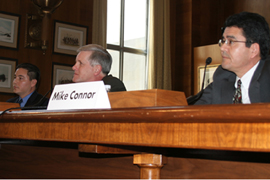Cronkite News has moved to a new home at cronkitenews.azpbs.org. Use this site to search archives from 2011 to May 2015. You can search the new site for current stories.
Feds, tribal officials call for efforts to settle, not sue over, water rights
WASHINGTON – Federal, tribal and legal officials agreed Thursday that all sides would be better off if they worked to settle water-rights claims rather than continuing to litigate them.
Settlements can help tribes secure water rights and help the government fulfill its promise that “reservations will provide their people with permanent homelands,” said David Hayes, deputy secretary of the Department of the Interior.
“Indian water rights settlements help us achieve that goal while at the same time ending decades and decades of controversy and contention among neighboring tribes and communities over water,” Hayes said in testimony to the Senate Indian Affairs Committee.
The hearing on tribal water rights came just one month after Arizona lawmakers introduced bills aimed at settling long-running Navajo and Hopi water claims.
The bill introduced by Arizona Sens. Jon Kyl and John McCain would fund three projects – the Leupp-Dilkon Groundwater Project and the Ganado Groundwater Project for the Navajo and the Hopi Groundwater Project – in exchange for the tribes dropping claims to Little Colorado River water. The Navajo would additionally drop claims over the government’s management of water from the Lower Colorado River, Kyl’s office said.
A companion bill was introduced in the House by Republican Reps. Ben Quayle of Phoenix and Paul Gosar of Flagstaff.
The proposal has received tentative support from both tribes but still needs their approval, in addition to congressional approval.
Hayes said such settlements provide certainty for non-Indians who have been “relying for many decades” on the water.
“In our judgment settlements are the way to go,” he said. “Why? Because Indian water rights affect not only tribal members but also non-Indians.”
A settlement also “gives you a lot greater flexibility,” said Stanley Pollack, assistant attorney general for the Navajo Nation. For example, he said Kyl’s bill does not set specific federal limits on how tribes can use the water but leaves that decision up to the Navajo and Hopi.
Pollack said the Navajo Nation aims to move the settlement along “as soon as possible” – with a goal of this year – but needs to hear from tribal members first.
Hopi officials could not be reached Thursday to comment on the prospects for the settlement before their tribal council.
The bills identify $199 million for the Navajo water projects and $113 million for the Hopi project – “significant” amounts, McCain said in a prepared statement, but “we are committed to ensuring that it is properly offset by reductions in direct spending elsewhere in the budget.”
Funding came up repeatedly at Thursday’s hearing as a point of contention in water-use agreements.
“We have always found that the funding is the most difficult issue,” said John Echohawk, executive director of the Native American Rights Fund.
But Maria O’Brien, legal committee chair of the Western States Water Council, said that if settlements like Kyl’s are not funded, those costs could be passed on to the economy of the Southwest.
“Postponing the implementation of Indian water rights settlements will be far more expensive for the federal government in the long run because increasing water demands, decreasing water supplies, and other factors will only increase the costs of resolving these claims,” she said in her prepared testimony.
Interior Department officials acknowledged financial concerns but said they are committed to settling issues in creative ways that protect tribal concerns and deliver “wet water” – usable water and not just water on paper.
“These are difficult issues to resolve,” Hayes said. “They often require substantial financial resources in order to finance the delivery of wet water to tribes.
“We are committed to making this truly a right that is realized by tribes in terms of wet water on their reservations and on their homelands,” he said.









